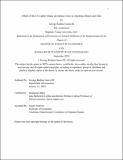| dc.contributor.advisor | Olken, Benjamin | |
| dc.contributor.author | Garcia III, George Reuben | |
| dc.date.accessioned | 2024-10-09T18:27:56Z | |
| dc.date.available | 2024-10-09T18:27:56Z | |
| dc.date.issued | 2024-09 | |
| dc.date.submitted | 2024-09-26T16:23:17.160Z | |
| dc.identifier.uri | https://hdl.handle.net/1721.1/157200 | |
| dc.description.abstract | Is it possible for major political events, such as the U.S. Capitol insurrection on Jan. 6, 2021, to influence political attitudes in other countries? Such events may act as framing devices that influence individuals to think somewhat differently about democracy and populism, primarily by reminding them of domestic shortcomings. Some previous literature has found international attitude effects from major events like terrorism or environmental disasters. In this study, I take advantage of the fact that the insurrection took place in the middle of a set of surveys administered to bureaucrats in Argentina, Brazil, and Chile. The events of Jan. 6 thus act as a type of exogenous shock, thus allowing for an interrupted time series analysis. I find that satisfaction with democracy generally declined across all three countries but only in Chile did support for democracy and elections fall and populist attitudes rise. | |
| dc.publisher | Massachusetts Institute of Technology | |
| dc.rights | In Copyright - Educational Use Permitted | |
| dc.rights | Copyright retained by author(s) | |
| dc.rights.uri | https://rightsstatements.org/page/InC-EDU/1.0/ | |
| dc.title | Effects of the US Capitol Attack on political views in Argentina, Brazil, and Chile | |
| dc.type | Thesis | |
| dc.description.degree | S.M. | |
| dc.contributor.department | Massachusetts Institute of Technology. Department of Economics | |
| dc.identifier.orcid | 0000-0002-6938-5477 | |
| mit.thesis.degree | Master | |
| thesis.degree.name | Master of Science in Economics | |
